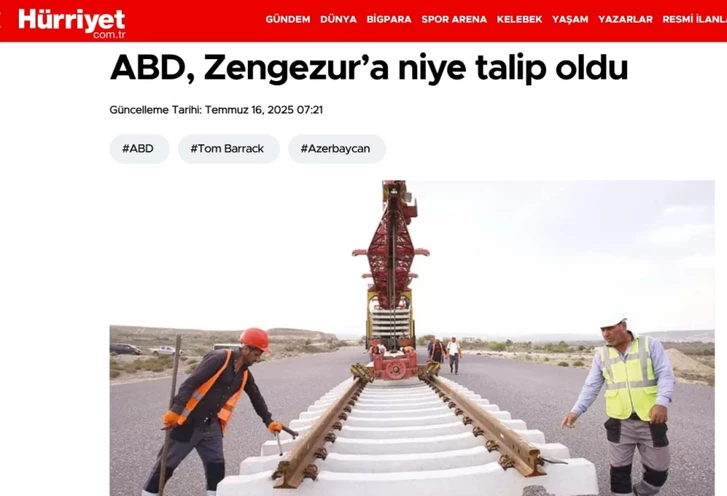YEREVAN, July 16 — Armenia may consider nationalizing its railway network, effectively removing Russian influence from strategic regional transport projects, including the highly contested Zangezur Corridor. That’s according to a report published by Turkey’s Hürriyet newspaper under the headline: “Why Do the U.S. Want a Stake in the Zangezur Project?”
The Turkish daily notes that Armenia’s rail infrastructure is currently under concession to South Caucasus Railway, a subsidiary of Russian Railways (RZD). As a result, any reopening or reconstruction of the Armenian section of the Zangezur route would typically require Moscow’s approval.
However, amid growing geopolitical tensions and Western involvement in the South Caucasus, Armenian Prime Minister Nikol Pashinyan is reportedly considering nationalization—a move that would effectively eliminate Russian control over one of the most strategic transport arteries in the region.
The article highlights increased U.S. interest in the Zangezur corridor, citing a provocative statement by U.S. Ambassador to Turkey Thomas Barrack, who last week said in New York that Washington is prepared to “lease” the 32-kilometer Armenian section of the route for 100 years.
The ambassador’s remarks triggered a political backlash in Yerevan. Armenian opposition leaders accused Pashinyan of “selling out” the country’s sovereignty and undermining national interests.
Hürriyet also refers to the trilateral statement of November 10, 2020, signed by Armenia, Azerbaijan, and Russia, in which Armenia pledged to unblock transportation links between western Azerbaijan and the Nakhchivan Autonomous Republic. Under that deal, the Russian Federal Security Service (FSB) was expected to oversee border and transport security along the corridor.
Yet, the Turkish paper reports that Yerevan now wants Moscow out entirely—not only from the corridor’s security provisions but even from logistical roles such as railway management.
“Ankara’s position,” Hürriyet concludes, “is that the corridor should be opened in line with the 2020 agreement and reflect the interests of all parties involved.”
The reported developments come amid a widening geopolitical contest over the South Caucasus, where the U.S., EU, Turkey, and Russia are vying for influence in post-war infrastructure projects that could reshape trade, security, and connectivity in the region.


